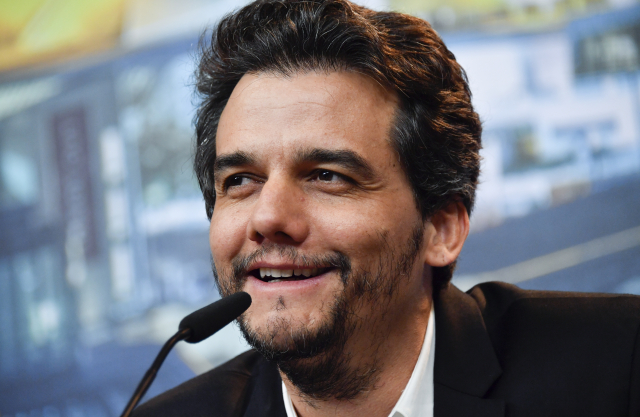‘Narcos’ star unveils ‘first resistance film’ of Bolsonaro era

Brazilian director Wagner Moura. Image: John Macdougall/AFP
“Narcos” star Wagner Moura premiered his new movie about a 1960s resistance hero Friday, calling it the first Brazilian blockbuster to attack state repression since far-right President Jair Bolsonaro came to power.
“Marighella” features Brazilian superstar Seu Jorge as Marxist revolutionary Carlos Marighella, who led an armed rebellion against the military dictatorship until he was gunned down in a police ambush in 1969.
Moura, 42, said the film, his directorial debut, had been in the works since 2013 but its release had dovetailed with a deeply polarised moment in his home country and around the globe.
“I shot the film under (former president Michel) Temer and Bolsonaro was kind of a joke. No one believed (he would become president),” Moura, who played drug kingpin Pablo Escobar in the Netflix series “Narcos,” told a small group of reporters at the Berlin Film Festival.
He said he didn’t want the movie, which graphically depicts the secret police hounding, beating and torturing Marighella’s band of revolutionaries, to be seen as a direct “response” to Bolsanaro, even as its themes grow more topical.
“Of course it is probably one of the first cultural products that is openly against what Bolsonaro represents,” Moura said of “Marighella”, adding that the current president had “trash-talked” the film before taking office.
Bolsonaro, a former army general who enjoys strong support from ultra-conservative Christians, expresses open admiration for Brazil’s 1964-1985 military dictatorship.
‘Right to resist’
The movie covers the aftermath of the coup, which the junta attempted to portray as the result of a popular uprising.
Citing the communist threat as a justification, the new government conducted a sweeping, brutal crackdown on dissidents and critical media outlets, with strong U.S. support.
Marighella became both public enemy number one and, like a handful of resistance leaders of the era, a pop hero for leftists around the world. Jean-Paul Sartre translated several of his works into French.
Moura noted that Bolsonaro and his supporters have also insisted on falsely calling the 1964 military coup the outcome of a grassroots “movement.”
“This is the first step, the semantic change — to say it wasn’t that bad. All the fascist governments, they always start with the semantic,” he said, calling it part of a global trend of populist “fake news”.
“This film is here to say the dictatorship was horrible. Citizens have the right and obligation to resist against dictatorship, against a violent state or one that doesn’t respect citizens.”
The director predicted “a lot of problems” for the film in Brazil, where it still does not have a release date.
“I am prepared for people going to the movies…(to be) throwing shit. I expect physical aggression,” he said.
Moura also starred in “Elite Squad” about police brutality in the favelas which won the Berlin festival’s Golden Bear top prize in 2008.
The director, who divides his time between Los Angeles and his native Bahia, said after playing the bloodthirsty Escobar, he had been drawn to this project about an idealistic martyr.
“I want to produce films in the U.S. that don’t reinforce stereotypes of Latin people,” he said.
Last year he produced and starred in “Sergio,” a Netflix film about the Brazilian UN High Commissioner for Human Rights Sergio Vieira de Mello, who was killed in Iraq in 2003. MKH
RELATED STORIES:
How Brazil’s Bolsonaro used Trump tactics in presidential campaign